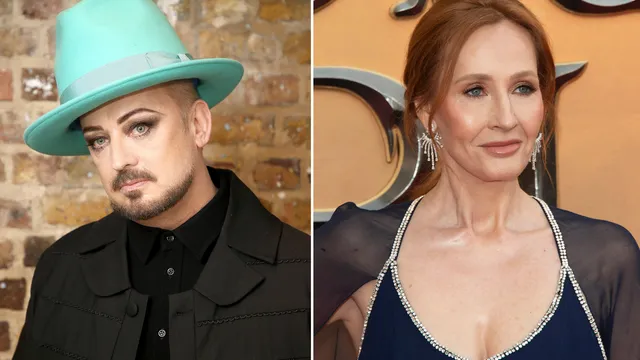
Boy George challenges J.K. Rowling on transgender rights controversy
2025-06-19 13:35- The conflict began when Boy George criticized J.K. Rowling's campaign to maintain women-only spaces, leading to a heated exchange on social media.
- Rowling responded to George by referencing his past conviction for assault while defending her position on women's safety.
- This incident reflects the ongoing debate regarding transgender rights and the implications for women's spaces in society.
Express your sentiment!
Insights
In recent months, a public clash occurred between singer Boy George and author J.K. Rowling over transgender rights and women’s safe spaces. This incident unfolded online after Boy George condemned Rowling's persistent efforts to maintain women-only spaces, labeling her a 'rich bored bully' on social media. Rowling responded sharply, referencing George’s past conviction for assault and criticizing his perspective on the necessity of safeguarding women’s spaces from potential male violence. This altercation highlights the divisive debates surrounding gender identity and women's rights in contemporary society, contributing to ongoing discussions about social justice and equality. The confrontation gained traction after Boy George reacted to another user's claim that Rowling was mainly responsible for attacks on trans rights. He stated that trans individuals deserve the right to be left alone from criticism, especially from someone as privileged as Rowling. Rowling's robust response included pointing out her own experiences with vulnerability, which shaped her views regarding single-sex spaces, as she questioned the rationale behind allowing trans women into women's shelters given the realities of male violence. Numerous public figures have weighed in on the ongoing controversy, reflecting a broader societal divide on gender issues. Stephen Fry, a colleague of Rowling's from the Harry Potter series, suggested that Rowling's views have become overly radicalized, leading to a troubling trend of transphobia in discourse surrounding the topic. He highlighted the pain and struggles of the transgender community and criticized the inflammatory nature of some of Rowling's statements. The altercation between Boy George and Rowling serves as a microcosm of the larger discourse surrounding gender identity, rights of transgender individuals, and the implications of policies regarding single-sex spaces. Former Harry Potter stars, including Daniel Radcliffe and Emma Watson, have distanced themselves from Rowling due to her remarks, illuminating the rifts that her comments have caused within the fandom. As the debate continues, it remains to be seen how public opinion may shift regarding both trans rights and the overall understanding of gender identity, signaling that this discourse is far from resolved.
Contexts
J.K. Rowling, the renowned author of the Harry Potter series, has been a significant and controversial figure in discussions surrounding transgender rights, particularly since 2020. Her views have sparked intense debate and garnered both support and criticism, illustrating the complexities of gender identity issues within the broader societal context. Rowling's engagement with these discussions was primarily catalyzed by her tweets that were perceived as criticizing the concept of gender identity and suggesting that sex is immutable, leading to accusations of transphobia from various advocacy groups and individuals within the transgender community. This initial backlash opened a wider conversation about her beliefs and the implications they have on the rights and recognition of transgender individuals. Critics charge that her stance perpetuates harmful stereotypes and undermines the legitimacy of transgender experiences and identities. They express concern that her influence as a prominent cultural figure could validate discriminatory views and policies against trans people, complicating efforts toward equality and acceptance in society. In contrast, Rowling's supporters argue that her views are based on a concern for women's rights and the potential implications of legislation aimed at gender identity. They contend that her perspective raises valid questions about the impact of self-identification policies on women's spaces, safety, and rights. Rowling herself has articulated her stance in several essays and public statements, emphasizing that her concerns are not rooted in hatred but rather a desire for a more nuanced discussion around sex and gender. She has expressed her support for the rights of transgender people but insists that the protection of women’s rights should also be recognized. This delicate balance between advocating for women and supporting trans rights illustrates the challenges faced in reconciling these intersecting issues. The ongoing dialogue surrounding Rowling's views reflects a broader societal struggle regarding the definitions of gender and the implications of transgender rights. Advocates for trans rights argue for a model that recognizes personal identity and autonomy, while many feminists emphasize the need to safeguard the rights and spaces traditionally associated with women. This tension often leads to polarized discussions, as both sides experience profound emotional investment in the outcomes of these debates. Rowling's public statements have undeniably contributed to further polarization, prompting many to examine the intersections of gender, identity politics, and freedom of expression in contemporary society. As discussions around transgender rights evolve, they continue to challenge various cultural norms and provoke critical reflection within feminist circles and beyond. As of 2025, the conversation surrounding J.K. Rowling's views on transgender rights remains as contentious as ever, with both supporters and detractors firmly entrenched in their positions. Organizations advocating for transgender rights continue to push back against narratives perceived as harmful while also advocating for a more inclusive and understanding approach to gender identity. On the other hand, Rowling's platform keeps her viewpoints in the spotlight, ensuring that the dialogue around transgender rights is both prominent and multifaceted. The complexity of these issues demonstrates the necessity for continued discourse and an openness to diverse perspectives in pursuit of a more equitable society for all individuals, regardless of their gender identity.